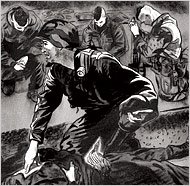The Troops Have Moved On

Owen West offered an appropriate Memorial Day tribute and a cogent argument for stopping the incessant political squabbling over the war in yesterday's New York Times. He rightly highlights the problem as one of leadership (or lack thereof) on both sides of the political aisle. Here are some highlights:
Read the whole thing.
Monk
"Neither party expected for the war the magnitude or the duration which it has already attained. Neither anticipated that the cause of the conflict might cease with or even before the conflict itself should cease."
So said Abraham Lincoln in his second inaugural address, describing a war that put 11 percent of our citizens in uniform and had by that point killed nearly one of out every seven soldiers. That his words are relevant again now is a troubling indicator of our national endurance.
We are at the outset of a long war, and not just in Iraq. Yet it is being led politically by the short-sighted, from both sides of the aisle. The deterioration of American support for the mission in Iraq is indicative not so much of our military conduct there, where real gains are coming slowly but steadily, but of chaotic leadership.
Somehow Operation Iraqi Freedom, not a large war by America's historical standards, has blossomed into a crisis of expectations that threatens our ability to react to future threats with a fist instead of five fingers. Instead of rallying we are squabbling, even as the slow fuse burns.
One party is overly sanguine, unwilling to acknowledge its errors. The other is overly maudlin, unable to forgive the same. The Bush administration seeks to insulate the public from the reality of war, placing its burden on the few. The press has tried to fill that gap by exposing the raw brutality of the insurgency; but it has often done so without context, leaving a clear implication that we can never win.
If we can put 2003's debates behind us, there is a swath of common ground on which to focus. Both Republicans and Democrats agree we cannot lose Iraq. The general insurgency in Iraq imperils our national interest and the hardcore insurgents are our mortal enemies. Talking of troop reductions is to lose sight of the goal.
Second, America's conscience is one of its greatest strengths. But self-flagellation, especially in the early stages of a war against an enemy whose worldview is uncompromising, is absolutely hazardous. Three years gone and Iraq's most famous soldiers are Jessica Lynch and Lynndie England, a victim and a criminal, respectively. Abu Ghraib remains the most famous battle of the war.
Soldiers are sick of apologizing for a sliver of malcontents who are not at all representative of the new breed. But they are also sick of being pitied. Our warriors are the hunters, not the hunted, and we should celebrate them as we did in the past, for while our tastes have changed, warfare — and the need to cultivate national guardians — has not. As Kipling wrote, "The strength of the pack is the wolf."
Read the whole thing.
Monk



